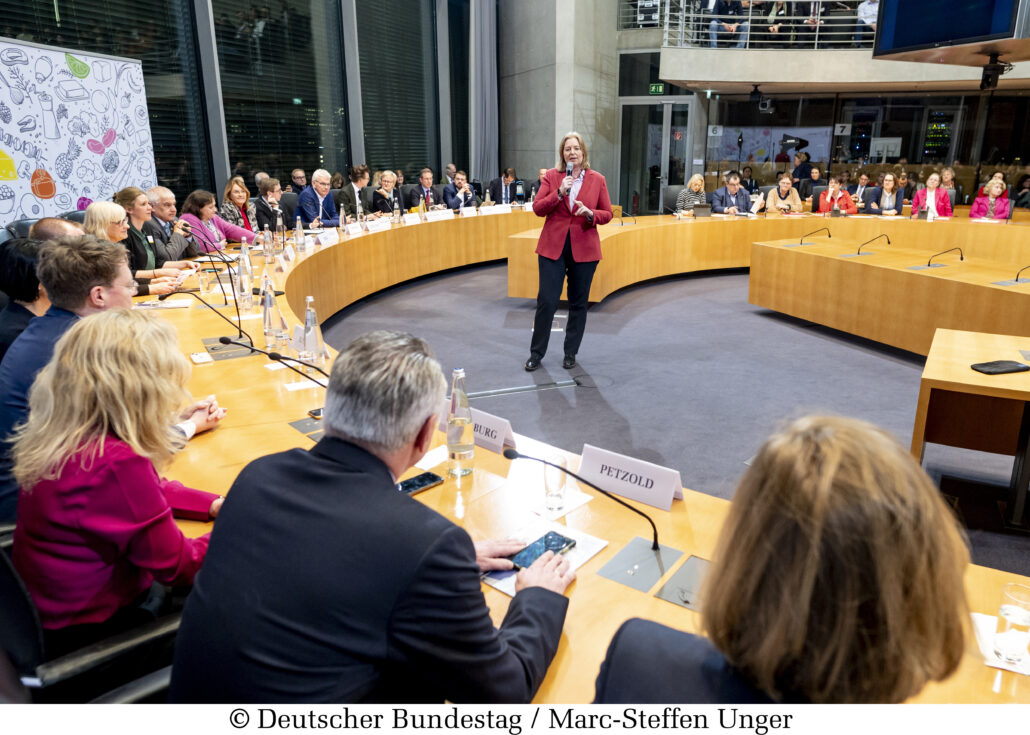Citizen participation has become more widespread at the federal level. How can the impact of these processes be ensured and increased?
Our theses: Discussion and exchange of experiences with politicians
We are seeing more and more public participation processes at the federal level that meet high standards in terms of process design and process quality, i.e., that offer a space for genuine dialogue or deliberation. We would like to provide food for thought on how public participation processes should be further developed and embedded to maximise their political impact. After all, if the practitioners in federal ministries are asked, it becomes clear that the processes to date are perceived as having only low to average impact.
Based on our experience with citizen participation processes at the federal level in recent years, we have developed three theses on effectiveness. We discussed and developed them further at a round table with representatives from various federal ministries, experts in citizen participation from academia, and foundations. In principle, the participants agreed with our theses:
- The process ownership for a public participation process should (also) lie with the departments responsible for the topics and content of the remit. Overarching topics require cooperation with the relevant units, departments, and divisions.
- Clarify responsibilities and dependencies: Which departments, divisions and/or specialised units are involved on the matter of participation? Which time frames and dependencies exist? How can the content and timing of the participation process be integrated into the policy cycle and decision-making process?
- Generate ownership: Involve management, (other) administrative departments and authorities in the participation process and its design and implementation, provided they are also responsible for utilising the results.
- Ensure professional support: Involve relevant specialist departments (also from other / subordinate authorities) in the content design, process support and evaluation of the participation results.
- The participation results should be made available and submitted in a format, quality and quantity which can be processed by the responsible bodies. It is important to dedicate the appropriate resources for further handling.
- Planning for results: What is the goal of participation? Agenda setting, prioritisation of topics, development of mission statements, strategies, or measures? How much input can be meaningfully processed?
- Clarify the scope for deliberation: What cornerstones of the decision-making process already exist? What framework conditions have already been set? When can the results of participation be well received?
- Form follows function: In which way should feedback and input be presented, analysed or summarized in order to be integrated into the policy cycle? How should this be structured and prepared?
- Be flexible and adjust to needs: Closely follow the needs and evolvement of the deliberation in order to support citizens in achieving and presenting results in a way that can have a real impact.
- The success and effectiveness of citizen participation formats is determined by high transparency and accountability. This includes feedback to the citizens.
- Establish governance rules for decision-making: Binding agreement at the beginning of the process on how to deal with the results.
- Create mutual understanding: Involvement of administrative staff and political decision-makers during the process and exchange with citizens on the results.
- Create transparency: Transparent and comprehensible presentation of the results as well as continuous information on the status of the results, e.g., on a central platform.
- Enable a level-playing-field for the deliberation: Provide feedback or a feedback event on how citizen recommendations can or cannot be integrated into policy and the reasons for it. (What could be implemented? What not? Why?)
Success factors for political effectiveness
The discussion of the theses focused primarily on the question of how successful implementation can be ensured and which aspects are also relevant to achieve a high level of political effectiveness. On the one hand, this involves specific procedural issues (e.g., involvement of administrative staff and processing of results), but on the other hand also addresses comprehensive questions of an incorporation in an expanded, participatory, responsive, and deliberative understanding of democracy (‘culture of participation’). For citizen participation processes to be effective, the following three aspects should be considered in addition to the theses:
1. Create improved and sustainable structures for citizen participation:
With new structures, the governing coalition could help elevate citizen participation and therefore increase its political relevance. Ideally, the Federal Chancellery would emphasize the importance of citizen participation within the federal government (top-down approach) while creating a central coordination and administrative unit. A firm anchoring with a dedicated cabinet committee at ministerial or departmental level increases the ownership of each ministry, as has been practiced in Baden-Württemberg for years. A joint online platform of the federal government can furthermore ensure greater visibility for citizen participation.
2. Create trust and provide an evidence-based basis for decision-making:
For participation processes to become more effective, trust and understanding in citizen participation must be developed and strengthened among political decision-makers. Involving political decision-makers and administrative staff in participation processes and engaging citizens directly within the structured process will help promote trust building. Internal training for administrative staff can also create and deepen a common understanding of participation. As a basis for decision-making, success indicators or evidence and impact of citizens’ participation should be collected systematically and made available (e.g., on the development and effects on participating citizens).
3. Ensure sustained continuity across legislative periods:
Sustained and structured knowledge exchange and networks should be created across ministries, parliamentary groups, and legislative periods to systematically anchor the topic of citizen participation. Through the constant exchange of knowledge and experience between the relevant players, all the aforementioned aspects can be initiated or continuously developed. In this way, the experience (best practices, challenges, methods) of other stakeholders can be utilized in specific cases. This can also lead to alliances to establish effective participation processes at the federal level.
Your contact persons

Jacob Birkenhäger
Business Unit Manager | Deliberation, Open Government, Democracy
| Phone | +49 30 536077-45 |
|---|---|
| jacob.birkenhaeger@ifok.de |

Tristan Fuhrmann
Managing Consultant | Open Government
| Phone | +49 30 536077-72 |
|---|---|
| tristan.fuhrmann@ifok.de |

Richard Steinberg
Consultant | Deliberation, Open Government, Democracy
| Phone | +49 30 5360 77-16 |
|---|---|
| richard.steinberg@ifok.de |

Huy Tran-Karcher
Consultant | Climate and Energy
| Phone | +49 30 5360 77-17 |
|---|---|
| huy.tran-karcher@ifok.de |
Read further

Article
Interview: Why citizens’ councils work
Event ● Online ● Participation ● Project
Citizens’ councils work! But why is that? Our interview with expert Jacob Birkenhäger…

Article
How citizens’ assemblies can effectively complement political work
Citizens’ assemblies are becoming increasingly important in Germany and Europe. How can randomly selected citi…
Continue reading „How citizens’ assemblies can effectively complement political work“
